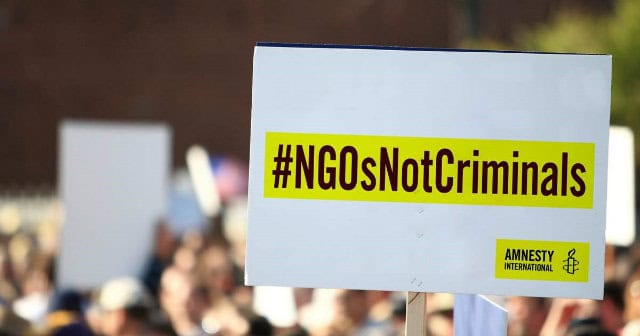Pakistan has a reactive yet a silent civil society; which at present seems contended with losing its space. It is seen aggressively reacting on various individual happenings but has always remained short of demonstrating required reaction on very serious issues.
Civil society being a third sector is supposed to keep a fixed vigil on legislature, executive and judiciary thus playing its role towards good governance in the country. However, Pakistan’s civil society usually miscarries in identifying issues that may cause potential emergencies in the country.

The Silent Storm
A silent yet inevitable storm is brewing in the humanitarian sector of Pakistan. The country will reckon its magnitude once the tide had risen to devastating height creating a situation impossible to handle both by the civil society as well as the Government. Civil society’s inability to understand and profess the ongoing crises faced by both local as well as international Non-Government Organizations (NGOs & INGOs) may translate into a humanitarian crisis in the near future. This crisis will seriously affect communities particularly those in less-hospitable remote areas.
In the recent years, the succeeding governments in Pakistan, displaying immunity to international reaction and reputational risk, started an aggressive crackdown on NGOs and INGOs. This clampdown was at the peak in 2015 when the PML-N led government unleashed regime’s authoritarian arsenal against these organizations. Restrictive laws and regulations were placed and thereafter new directives were issued to these organizations, which could soon feel the government’s nose around their necks. In recent months, the campaign has again picked up the pace due to Financial Action Task Force’s (FATF) adverse report on Pakistan.
NGOs in Pakistan are working in areas where the government either lacks access or does not have capability to address issues at grass root level. No government, including those in developed countries, can claim the reach, access and capacity to guarantee welfare of its citizens thus NGOs and INGOs always find their role to fill this gap between the people and the governments. Pakistan, in no case can claim achievement of desired success at least in the areas listed as sustainable development goals by United Nations, a humanitarian binding on the Government of Pakistan. With host of issues and difficulties including lack of development, poor standard of life, stagnant literacy rate and significant percentage of people living under the poverty line, the Government will always need assistance from NGOs and their donors to contribute towards welfare of its people.
Acceptable and Non-Acceptable
The number of active NGOs in the country, at the very least, is estimated in thousands. Majority of these NGOs fall in the category of community development-oriented outfits. These NGOs emerged on national scene to fill the service delivery void left by the government’s ability and incapacity to deliver basic services in the early 80s. These organizations earned credibility in society particularly due to their on ground innovative service delivery models ranging from community physical infrastructure, advocacy on social issues like family planning while mainstreaming concepts of climate change and vulnerabilities. However, these NGOs were structured on the lines of licensed regime. This permit to operate scenario created a list of favored, non-favored, acceptables and non-acceptables in the eyes of the state. These categories created perverted incentives for state regulators to flex and arm twist these NGOs according to the overall policy direction. One main reason to the common reckoning is that state institutions linked the civil advocacy by these NGOs to the influx of foreign donations and grants, thus looked at the activities of NGOs & INGOs with ire and suspicion. This attention on NGOs, made these organizations synonymous with independent civil groups in society which were taken as part of a neo-liberal agenda.
Each year Pakistan suffers huge losses in terms of lives and economy due to natural disasters badly impacting livelihood of vulnerable groups including the disabled, elderly, children and women. Torrential rains triggering devastating floods, earthquakes, avalanches and glacial lake outburst floods (GLOF) are recurrent calamities in the country. Droughts particularly in southern parts of country have proved dangerous particularly for children in these under- developed areas. Due to extreme weather and climate conditions, threatening prospects of natural disasters would continue to create crises situations in Pakistan. Besides these, a number of humanitarian issues including lack of education, health, access to clean water, sanitation and hygiene in geographically isolated areas will continue to stare in the eyes of destitute government. As compared to government, NGOs have done remarkably well attracting and then spending heavy funds on local populace specifically targeting the underprivileged sections of society in inaccessible areas of country thus supporting the government.
The Red Tape
A number of these organizations were banned in recent years suspecting them to be working on an alleged clandestine foreign agenda while for few other NGOs, government chose to restrict their physical movement and dry up their funding streams. Due to the prevailing negative perception about NGOs it has been relatively easy for the government to start strong bridling measures while the civil society at large didn’t respond to advocate for these organizations. The good reason for lack of response by civil society on anti-NGO actions could be the negative perception amongst masses that probably these NGOs undermined the sovereignty of the state or these were linked to hostile intelligence agencies. Since the arrest of Dr. Shakil Afridi (then an employee of one of an INGO working for US intelligence) not only the Government but public at large also started to view all such non-government entities as proxies of hostile intelligence agencies. However, this stereotyping swelled in recent years to dangerous levels creating an air akin to the events in Europe which led to persecution of Jews despite the fact that fact that Jews were never a real threat to the totalitarian regimes of that time.
The Companies Act 2017 placed a number of restrictions on these organizations. The restrictive legislation, declared that foreign funding for NGOs must be pre-approved by the state, including strict clearance regime by security agencies. As the NGOs felt strict regulations placed on them, these slowly started to affect the people of the areas where these organizations were actively working with encouragingly tangible achievements. Majority of the NGOs were clean and never deserved to be suspected since these showed desired transparency in their system and had significantly helped backward communities by improving health, education etc. Notices were issued and unannounced ban was slapped on number of these organizations during last couple of months. A significant number of these NGOs are still kept in limbo about government’s decision without processing their cases for several months since it took considerable time to process their security clearances with relevant agencies.
Whole Nine Yards
As per fresh procedure in vogue, all the NGOs operating in the country are required to register a Memorandum of Understanding (MoU) and obtain a Non-Objection Certificate from Ministry of Foreign Affairs (Economic Affairs Division) or Ministry of Interior. It is also mandatory for such organizations to be registered before the implementation of any project and the MoU permitted the NGO to accept funds from declared foreign sources. The de facto anti-NGO drive is literally pushing these NGOs into a complex labyrinth leaving them with choices either to quit or to find their own way out by adapting to the inhospitable situation.
For NGOs, difficulties have increased many folds. A long channel of security clearances, to be conducted not by one but by multiple security agencies, is one of their prime concern. It is understood that a slight negative remark by any single of these multiple security agencies means that the NGO has to pack up and leave with no opportunity to contest its position. As per NGOs, the process of these clearances is not transparent and approval can be denied without mentioning actual reason.
While the NGOs are becoming uncomfortable with the Government, the ministries are trying to shift the blame as well as the heavy burden on security agencies which are already embroiled into managing over all security situation in the country. The security outfits are over-burdened with ground check tasks and due to shortage of manpower processing of these clearances takes months. Since every NGO cannot be trusted on the face value thus these ground checks are done with extreme care and diligence which definitely requires time. This delay further frustrates the NGOs while the Government does not seem to care much about addressing this growing frustration. Since the NGO sector mainly thrived on foreign funding, the donors are scared to invest and have stopped the funds thus leaving several NGOs penniless and completely dry. Complex bureaucratic channels and procedures where these NGOs are forced to face administrative fury is costing these organizations both money as well as other resources. Pushing their cases through these formal conduits is now a herculean task. Meanwhile, fear of raids on offices and houses of these organizations, as recently witnessed, has further compounded the unending difficulties for these NGOs. Hundreds rather thousands of qualified people are leaving these organizations thus increasing figures in unemployment rate in the country.
Asking an NGO to stop its work seems easy but has serious negative repercussions. Recently some NGOs had to abruptly halt their projects such as schools, health facilities. The irony now is that neither the Government nor the local community has capacity to takeover these projects where huge funds and assets are already invested by NGOs. Thus as a result the beneficiary community suffers.
Response to Narrative
While one narrative accused these NGOs and INGOs for discretely serving vested interests to conspire against the stability in the country, the NGOs on other hand failed to defend themselves against this tirade. Instead of presenting tangible results by projecting their voices on social as well as legal platforms, these NGOs prefer to remain silent thus in a way accepting the label. Lot many have faced punitive actions such as frozen assets, raids on their offices and even apprehension of their employees recently yet the organizations failed to mobilize support even from the communities they were serving.
The Green Light
The Government has obligations to fulfil and particularly after being placed on the Financial Action Task Force’s (FATF) grey list, yet the Government must also settle the distrust with NGOs since these organizations help in fulfilling the countries other moral commitments especially towards well-being of people and achieving sustainable development goals. Scaring away international donors also doesn’t help the country’s economy particularly when it is in shambles. The overly restrictive regulations seriously affect the communities and not the NGOs only. Government should introduce a system of NGO accountability without coercive measures. After all, if the government lacks capacity and seems virtually deficient why the poor citizens should be left deprived of support by service delivery NGOs. Citizen’s right to public service should not be denied at any cost. Instead of roughing up these NGOs unnecessarily, Government needs to reconsider the policy since the interest of vulnerable segment of the population is at stake. Government should also devise means and resources to maintain the projects started by NGOs where communities are not organized or strong enough to take over the running projects. Government must realize that it isn’t about an NGO alone but this is about humanitarian issues and sustainable development in the country.

For NGOs adaptation is the suggested strategy, especially for serious organizations which have will to stay and continue with the good work. NGOs in Pakistan should learn from instances from around the globe where such organizations have won the trust of local populace they serve as well as the Government. It is important to defeat the negative perception by presenting a counter narrative which will also help these in their development work. It needs to be highlighted that NGOs do understand their obligations towards country where they are operating. Actions speak louder than words thus the good work by NGOs will be only campaigner for these organizations, which must be projected judiciously. Last not the least, the domestic civil society should wake up and realize the crises that is directly affecting under privileged communities in far-flung areas and empower the organizations with a vociferous support so that these organizations could continue with their good work towards service of mankind.














